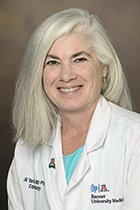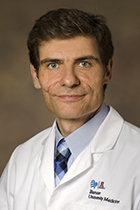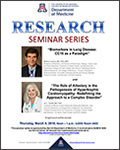NOTE: This seminar was given solely by Dr. Stefano Guerra; for a photo gallery of his presentation, click here; for archived video, see this link.
 Cardiologist Jil Tardiff, MD, PhD, has been added to the lineup for the March 8 University of Arizona Department of Medicine Research Seminar Series, noon-1 p.m., Thurs., March 8, in Room 5403 of the UA College of Medicine – Tucson.
Cardiologist Jil Tardiff, MD, PhD, has been added to the lineup for the March 8 University of Arizona Department of Medicine Research Seminar Series, noon-1 p.m., Thurs., March 8, in Room 5403 of the UA College of Medicine – Tucson.
The title of her talk will be, “The Role of Allostery in the Pathogenesis of Hypertrophy Cardiomyopathy: Redefining the Approach to a Complex Disorder.”
Speaker Realignment
Dr. Tardiff joins pulmonary epidemiologist  Stefano Guerra, MD, PhD, MPH, as a presenter. Dr. Guerra, a professor of medicine, UA Division of Pulmonary, Allergy, Critical Care and Sleep Medicine; professor of public health, UA Mel and Enid Zuckerman College of Public Health; the Henry E. Dahlberg Chair in Asthma Research at the UA College of Medicine – Tucson; director, population science, UA Health Sciences Asthma and Airway Disease Research Center; and UA BIO5 Institute member, will speak on "Biomarkers in Lung Disease: CC16 as a Paradigm."
Stefano Guerra, MD, PhD, MPH, as a presenter. Dr. Guerra, a professor of medicine, UA Division of Pulmonary, Allergy, Critical Care and Sleep Medicine; professor of public health, UA Mel and Enid Zuckerman College of Public Health; the Henry E. Dahlberg Chair in Asthma Research at the UA College of Medicine – Tucson; director, population science, UA Health Sciences Asthma and Airway Disease Research Center; and UA BIO5 Institute member, will speak on "Biomarkers in Lung Disease: CC16 as a Paradigm."
She replaces one of the original speakers for this seminar, Yves Lussier, MD, a professor of medicine, director of the UA Health Sciences Center for Biomedical Informatics and Biostatistics, associate director of informatics for the UA BIO5 Institute, and associate vice president and chief knowledge officer, UA Health Sciences. His talk has been moved to the June 7 DOM Research Seminar. For a full list of speakers in this series—including video and photo galleries from past lectures, click here.
 For the updated flyer for this event, see this link:
For the updated flyer for this event, see this link: ![]() dom-research-seminar_03-08-2018_flyer_update.pdf
dom-research-seminar_03-08-2018_flyer_update.pdf
Dr. Tardiff is a professor of medicine (Division of Cardiology) and cellular and molecular medicine; vice chair for research, Department of Medicine; a member of the UA BIO5 Institute and UA Sarver Heart Center, and the Steven M. Gootter Endowed Chair for Prevention of Sudden Cardiac Death at the UA.
Her topic—hypertrophic cardiomyopathy—looks at a progressive disease of the heart muscle in which the heart becomes abnormally enlarged, thickened, and/or stiffened. This reduces efficiency in the heart’s ability to pump blood, which can cause heart failure and backup of blood into the lungs or rest of the body. It can affect people of any age or gender and is a common cause of sudden cardiac arrest and death in young people.
About Dr. Tardiff
Dr. Tardiff earned her bachelor’s degree in genetics from the University of California at Berkeley (1984) and her medical degree and doctorate (in cell biology) at the Albert Einstein College of Medicine in New York City (1992). She pursued her housestaff training at New York’s Columbia-Presbyterian Medical Center (now New York-Presbyterian). As one of the first participants in the ABIM Clinician-Scientist pathway as a Markey Fellow, she completed an internal medicine residency combined with a clinical-research fellowship in cardiovascular medicine at Columbia University. In 2001, she joined the faculty at the Albert Einstein College of Medicine as an assistant professor of medicine, physiology and biophysics, later achieving the rank of associate professor.
In 2012, Dr. Tardiff joined the faculty at the UA College of Medicine – Tucson. Her research focuses on mechanisms that underlie development of the most common form of genetic cardiomyopathy, those caused by mutations in proteins of the cardiac sarcomere, hypertrophic cardiomyopathy (HCM). These complex disorders affect one in 500 individuals of all ages and represent the most common cause of sudden cardiac death in the field. Her studies, detailing the mechanisms of disease pathogenesis at the level of individual cells using transgenic mouse models, have been funded by the National Institutes of Health (NIH) since 2001 and cited in support of new clinical trials to evaluate novel treatment modalities for this challenging cardiomyopathy.
Her most recent grants include $1.87 million awarded in December 2017 by the National Heart Lung and Blood Institute (NHLBI), an NIH unit, to continue her lab’s study of an “Integrative Approach to Divergent Remodeling in Thin Filament Cardiomyopathies.” In January, Dr. Tardiff was awarded another NHLBI grant for $1.94 million to study “A New Paradigm to Incorporate Protein Dynamics into Targeted Small Molecule Design for Sarcomeric Cardiomyopathies: A Proof of Concept for Thin Filament Therapeutics.”
About Dr. Guerra
Dr. Guerra’s talk extrapolates on research for which he recently won a $3.6 million grant from the National Institute of Allergy and Infectious Diseases, another NIH unit, to investigate whether management of a protein (CC16) found in the distal airways of the lungs could decrease the likelihood of persistence of childhood asthma into adulthood.
He also will be talking about “Biomarkers” in lung disease at the March 2 lecture (in BIO5 Room 103, 9-11 a.m.) for the Spring Colloquium on Problems in Complex Diseases, hosted by Donata Vercelli, MD, director, UA’s Arizona Center for the Biology of Complex Diseases.
Dr. Guerra came to the UA after receiving his medical degree at the University of Milan, Italy. At the UA, he completed a master’s degree in public health, and earned a doctorate in epidemiology with a minor in genetics. He has been on the UA faculty since 2003.
His main academic interests include the natural history and phenotypic overlap of asthma and chronic obstructive pulmonary disease (COPD), the childhood roots of adult lung diseases, and use of biomarkers and genomic tools to identify molecular components and develop tailored interventions in lung disease. His research has been continuously funded for the last 15 years through the National Institutes of Health, Francis Family Foundation, American Heart Association, Cystic Fibrosis Foundation, and American Thoracic Society.
—David Mogollón
ALSO SEE:
“Big Data and Biomarkers in Lung Disease Subjects of March 8 DOM Research Seminar Lectures” | Posted Feb. 16, 2018

